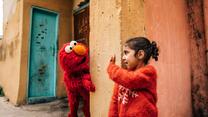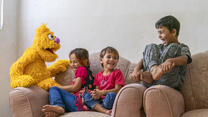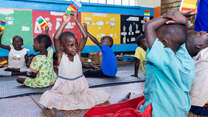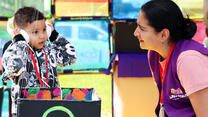WHO WE ARE
The mission of the International Rescue Committee (IRC) is to help people whose lives and livelihoods are shattered by conflict and disaster to survive, recover and gain control of their future. Our vision is that the IRC will lead the humanitarian field by implementing high-impact, cost-effective programs for people affected by crisis, and shape global policy and practice by sharing our learning and experience with others.
All IRC programs are designed to achieve meaningful change in people’s health, safety, education, economic wellbeing and ability to influence the decisions that affect their lives. Our Education programs seek not only to improve learning, but also to achieve overall well-being. We believe that education during crisis and conflict is a necessity, not a luxury. Throughout our 84-year history, education programs have been an essential part of the IRC’s response in working with people affected by conflict.
The IRC’s education programming for primary school-aged children has three overarching goals:
- to ensure that children enroll in and attend school regularly;
- to protect children from all forms of violence in school and on their way to school; and
- to build fundamental reading, math and social-emotional skills.
- Social and emotional skills, sometimes called life skills or emotional intelligence, help a person build resilience, understand and manage emotions, control their impulses and persevere, solve problems, set and achieve goals, feel and show empathy for others, and establish and maintain positive relationships.
WHY OUR WORK MATTERS
Half of the world’s 59 million children who are out of school live in crisis affected countries.
Education is absolutely critical for school-aged children living in communities affected by crisis and disaster. School is where they develop foundational reading and math skills, as well as the social and emotional skills to help them recover, persevere, learn and be resilient in the face of adversity.
Education is known to have far-reaching benefits for individuals, their communities and future generations; it increases income, reduces child marriage and early pregnancy for young women and girls, and helps them raise healthier families when they do become mothers.
WHAT WE DO
IRC practitioners provide technical assistance to more than 30 country programs. Technical advisors are charged with staying abreast of the best available research and practices in their respective fields and sharing these with the IRC’s frontline teams. They also lead advocacy strategies to encourage partners and policy makers to adopt the interventions proven to be effective based on our research and experience.
Learning in healing classrooms
Built on 30 years of education in emergencies experience and a decade of research and field testing, the IRC’s Healing Classrooms approach provides teachers and parents with the skills they need to ensure children have a safe, predicable place to learn and cope with the consequences of conflict. Unlike many education programs that focus solely on teaching academics, Healing Classrooms provide teachers with the skills and support they need to build children’s social-emotional skills, as well as their capacities in reading, math and other traditional subjects.
Recognizing that parents play a critical role in building the lifeskills that children need to navigate adversity, build their resilience and persevere, Healing Classrooms work with caregivers to foster nurturing and positive relationships with their children.
This approach is based on research that shows social-emotional learning programs improve students’ life skills, behavior and academic performance.
Opportunities for equitable access to quality education (OPEQ), a 5-year teacher training program, aimed to improve the reading, math and social-emotional outcomes for children in eastern Democratic Republic of the Congo (DRC). A rigorous study, carried out in partnership with New York University’s Global TIES for Children, assessed learning in Healing Classrooms in over 100 schools and with 644 teachers in the DRC. Results showed the Healing Classrooms approach improved students’ reading and math scores.
Meeting education needs with non-formal education
For the IRC, a “school” does not have to be a traditional brick and mortar institution. In countries torn apart by conflict and crisis, where formal school systems are disrupted or inaccessible, the IRC helps families and communities establish formal or informal spaces where children can learn in a safe environment. In an acute crisis, Safe Healing and Learning Spaces, also known as Child- Friendly Spaces, are often the first learning environments the IRC and community members establish for children.
Similarly, the IRC forms community-based education (CBE) programs when there is no other option for children to learn. Community-based schools are led and managed by educators, parents or other leaders, and classes take place in a community space or home. This approach has proven to be an effective means of bridging the gaps where access to education is blocked by distance and geography, security concerns, financial hardship and lack of resources. Working independently or in partnership with local and national governments, CBE can dramatically improve enrollment and attendance.
Because it is designed to be flexible and respond to various contexts, CBE can supplement formal, national systems under strain to accommodate the educational needs of refugees and displaced populations, or to sustain and expand services in fragile and resource-depleted environments.
Finally, accelerated learning programs (ALPs) are offered to children who have missed out on months or years of formal schooling due to conflict or crisis. These programs provide a condensed curriculum, allowing children to catch up with their education and eventually reintegrate into formal schools.
In Afghanistan, the Basic Education for Afghanistan Consortium (BEACON) program provided access to education for 25,517 children, youth and adults through 917 ALPs, CBE programs and adult literacy classes in rural and remote regions of Afghanistan. Afghanistan’s Ministry of Education adopted the Community-based education model and absorbed village-based schools into the national system.
Teacher professional development
Research shows that teachers who engage in professional development on a regular basis gain better teaching skills and are more likely to be motivated and stay in the profession. The IRC supports tens of thousands of teachers working in the most challenging, under-resourced and volatile settings. We provide them with the practical tools and training they need to create positive, nurturing environments where children are protected from violence, feel cared for and experience stability and predictability amidst the chaos of crisis.
The IRC works with teachers to understand and respond to the distinct needs of different learners, such as boys and girls, and to strengthen their own well-being by providing opportunities to learn from their peers and professional coaches. We provide teachers with curricula, lesson plans and activities that teach traditional academic subjects, as well as social-emotional skills. Our materials are contextualized with education leaders or ministries of education in each country.
In Pakistan, the IRC is providing 23,800 teachers in our largest-ever reading project with books and classroom materials, as well as training materials such as tablet-based professional development videos and guides.
In Iraq, the IRC has trained over 300 teachers working in 25 schools in lesson planning and child protection. Educators regularly participate in teacher learning circles—facilitated forums for teachers and school management on topics ranging from pedagogy to class management. To support and monitor what teachers have learned from both the training and learning circles, IRC education officers conduct continuous classroom observation and mentoring sessions.



